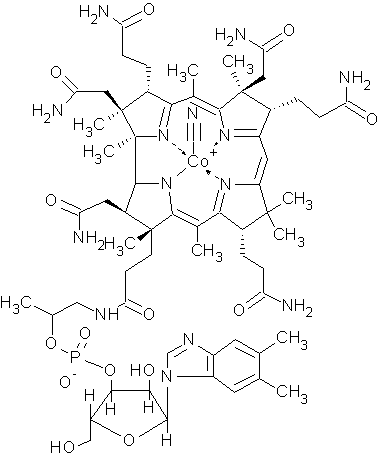Vitamins are substances that play an essential role in human metabolic processes, but which human cannot synthesize (except vitamin D). Small amounts of vitamins are essential for the regulation of all bodily processes. Vitamins must be obtained from the food on a daily basis. A person's diet must provide all the necessary vitamins. In their absence people develops certain deficiency diseases or other abnormal conditions.

|
| Figure. Vitamin B12 Struture |
Vitamin B12 is a cofactor of methionine synthase. This enzyme is required for the synthesis of the amino acid, methionine, from homocysteine. Methionine in turn is required for the synthesis of S-adenosylmethionine, a methyl group donor used in many biological methylation reactions, including the methylation of a number of sites within DNA and RNA. Methylation of DNA may be important in cancer prevention. Inadequate function of methionine synthase can lead to an accumulation of homocysteine, which has been associated with increased risk of cardiovascular diseases. Vitamin B12 is also a cofactor for L-methylmalonyl-CoA mutase. This enzyme plays an important role in the production of energy from fats and proteins. Succinyl CoA is also required for the synthesis of hemoglobin, the oxygen carrying pigment in red blood cells.
Deficiency of vitamin B12 has been linked to multiple sclerosis, asthma, low sperm counts, and depression.
Vitamin B12 is one of many vitamins in the vitamin B family that has a positive effect on vision.
Particularly, having a healthy level of vitamin B12 has been linked to a reduced chance of developing cataracts.
Foods containing relatively large amount of Vitamin B12 include fish, eggs, dairy products and organ meats. Plant products generally contain low level of Vitamin B12. Vitamin B12 is water-soluble.















